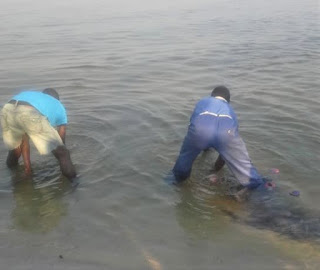HIGHLIGHTS OF LIFE IN LUNGA- 4
SWIMMING AS PASTIME AND SURVIVAL ACTIVITY Can You Swim? Most people know swimming as merely a sport. Nature dictates that we in Lunga treat swimming as a critical activity. The fact that water is all around us makes it instinctive that we learn to swim; not only for leisure and pleasure but also for survival purposes. Most accidents we are involved in concern capsized canoes and boats when we travel around the islands; and safety equipment such as life jackets are unaffordable to many. Swimming is therefore a survival skill that MUST be learnt at a very tender age. Usually, our mothers like performing certain chores from the harbour. You will find them in good numbers at a harbour with white crystalline fine sand washing their pots, plates and clothes after which they will swim in clear, fresh water. As children, you follow your mothers and play in shallow water while they keep that love-punctuated watchful eye over you. As you grow older, you stop that s...
 SoundCloud
SoundCloud



